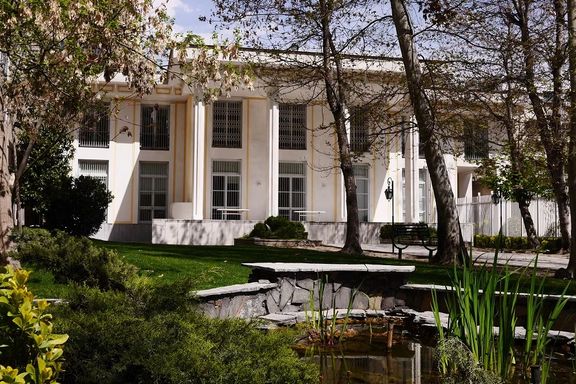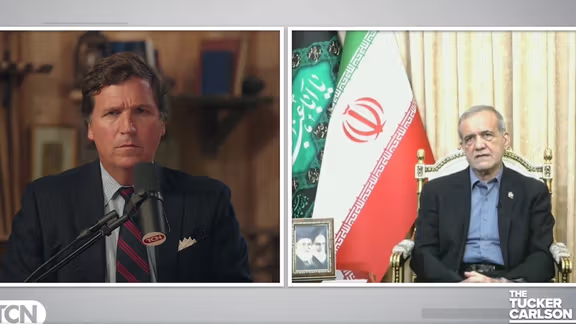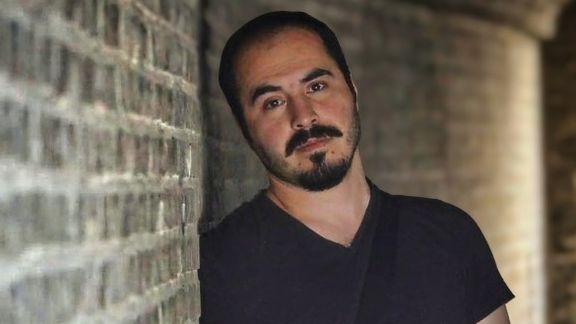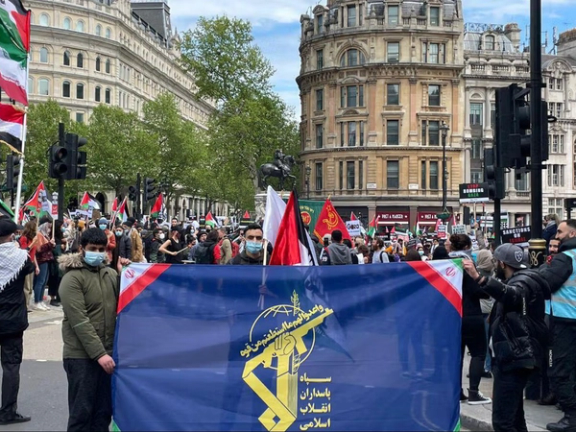UK, Swiss embassies in Tehran reopen after closures during Iran-Israel war

The United Kingdom and Switzerland say they have resumed their embassy operations in Tehran following temporary closures during the 12-day war between Iran and Israel.

The United Kingdom and Switzerland say they have resumed their embassy operations in Tehran following temporary closures during the 12-day war between Iran and Israel.
UK foreign office minister Hamish Falconer told parliament on Monday that the British embassy has reopened and a chargé d'affaires is now in place.
“We will continue to play our full role to ensure the safety of British nationals in Iran,” he said.
The Swiss Embassy, which represents US interests in Iran, also reopened on Sunday after nearly two weeks of closure. Services remain limited to consular visits, with visa-related services still suspended, the embassy announced.
Swiss intelligence warns of growing Iranian espionage threat
The reopening comes as Swiss authorities raise security concerns over Iranian espionage. On Wednesday, Switzerland’s Federal Intelligence Service (FIS) warned that Iran poses a growing intelligence threat to Swiss diplomats.
In its annual "Security Switzerland 2025" assessment, the agency said Switzerland’s role as Washington’s protecting power in Tehran increases the visibility of Swiss personnel to hostile intelligence services.
The warning followed a joint SRF and RTS investigation aired Tuesday, in which a former IRGC officer said Swiss diplomat Sylvie Brunner was pushed from her Tehran balcony in May 2021 after a failed surveillance operation. Iran ruled it a suicide but has not shared full case files with Swiss authorities.
Brunner’s brother believes she was murdered. A Swiss forensic report found key organs missing, making toxicology tests incomplete. It said suicide was plausible but could not rule out foul play.
Her death was the first of four suspicious cases involving Swiss nationals in Iran. Others include the 2023 death of a defense attaché, the stabbing of a local embassy employee, and the 2025 death of a Swiss tourist in prison.
Swiss officials say they are pressing for full transparency in each case but have no jurisdiction to conduct investigations on Iranian soil. Without access to evidence or cooperation from Iranian authorities, their ability to determine what happened remains limited.

Iranian President Masoud Pezeshkian told US right-wing commentator Tucker Carlson that Israel was seeking to embroil the United States in a Mideast 'forever war', in his first international interview since US and Israeli attacks on Iran.
“Netanyahu, as I said, has his own agenda. He wants to drag the US into forever wars… and to bring more insecurity and unrest to the whole region," Pezeshkian told Carlson in the virtual discussion, referring to the Israeli Prime Minister.
Carlson is an outspoken critic of US military action against Iran and a top dissenter from among President Donald Trump's populist base. The US President dismissed his views as "kooky".
Pezeshkian, a relative moderate, has advocated for greater engagement with Washington but hardline Supreme Leader Ali Khamenei ultimately decides policy.
Responding to a question on whether two senior clerics had issued a fatwa to kill Trump, Pezeshkian said, “To the best of my knowledge, they have not issued decrees or fatwas against any individual or against Donald Trump. It has nothing to do with the Iranian government or the Supreme Leader of Iran."
"What they actually meant by the fatwa was the condemnation of an insult to a religion or religious personalities … It should not be construed or considered as a threat against an individual.”
Last month, Alireza Panahian, a hardline Iranian cleric close to Iran’s Supreme Leader called on Muslims to kill Trump and Netanyahu in response to their threats against Khamenei, citing fatwas that declare him a mohareb, or “enemy of God.”
Najmuddin Tabasi, a member of the Society of Seminary Teachers of Qom, said Trump “must be executed” and warned that “the same hand that fired a shot past his ear can put a bullet through his throat.”
Referring to recent fatwas by Ayatollahs Naser Makarem Shirazi and Hossein Nouri Hamedani, Tabasi said he was confident that “brave youth will deprive Trump of security.”
Pezeshkian also denied Iran had sought to kill Trump in an alleged plot detailed by US law enforcement last year.
'No problem' with reviving talks
Iran has never pursued nuclear weapons, Pezeshkian said, citing religious prohibitions and cooperation with international inspectors.
“We have never been after developing a nuclear bomb—not in the past, not presently or in the future—because this is wrong. And this is in contrast to the religious decree or the fatwa which has been issued by the Supreme Leader … so it is religiously forbidden for us to go after a nuclear bomb.”
Ongoing conflict with Israel had sabotaged nuclear negotiations, he said, adding that talks with the US had been progressing when Israel launched attacks on Iran.
“We were sitting at the negotiating table when it happened. And by doing this, they totally ruined and destroyed diplomacy.”
“We see no problem in reentering the negotiations. But how are we going to trust the United States again? We reentered the negotiations. Then how can we know for sure that in the middle of the talks, the Israeli regime will not be given the permission again to attack us?”
White House envoy Steve Witkoff is planning to meet Iranian Foreign Minister Abbas Araghchi in Oslo next week to relaunch nuclear talks, Axios reported on Thursday, citing two sources familiar with the preparations.
The meeting would mark the first direct engagement since President Trump ordered strikes on Iran’s nuclear facilities last month. Neither side has publicly acknowledged the planned talks.
Alleged Israeli assassination attempt
Pezeshkian said Israel had attempted to assassinate him, describing a strike on a meeting he attended. There was no immediate Israeli or independent corroboration of his claim.
“They did try, yes, and they acted accordingly, but they failed. I am not afraid of sacrificing myself in defense of my country."
Israeli escalation would only deepen regional instability, he warned.
“Will it bring peace and tranquility and stability to the region? It was not the US that was behind the attempt on my life. It was Israel. But as I told you before, it is God who wills when a person will die.”
Pezeshkian framed the conflict as a product of Israeli ambitions and urged Washington to avoid becoming entangled.
“My proposal is that the US administration should refrain from getting involved in a war that is not America’s war. It is Netanyahu’s war that is having its own agenda … an inhuman agenda, and that is having forever wars, wars that go on and on.”
'Death to America' misunderstood
The Iranian president said that “Death to America” slogans were misunderstood. “They don’t mean death to the people of the United States, or even to the officials. They mean death to crime, death to killing and carnage, death to supporting killing others.”
Pezeshkian also said Ali Khamenei has no objection to the operation of US businesses in Iran even under the currency circumstances, and there has never been any limitation from Tehran’s side, attributing barriers to American sanctions.
"The Supreme Leader told me American investors are welcome in Iran. There is no limitation and there's nothing preventing the US investors from coming to Iran to make investments, even presently," he said.
“It is not to be in the interest of the United States to be involved in any kind of war in my region,” he said. “It is up to the United States president to choose … whether to replace war mongering and bloodshed with peace and tranquility.”

Iran has accused detained political activist Hossein Ronaghi of “propaganda against the Islamic Republic in favor of Israel” over an Instagram story he posted after the start of Israel’s strikes during the recent 12-day war, Iran International has learned.
The charge was brought under Article 8 of the Law on Confronting Israeli Actions.
Ronaghi was arrested on June 23 by order of Tehran’s prosecutor and the Culture and Media Court, and a 30-day temporary detention order has been issued. He is being held in a Ministry of Intelligence safe house.
Ronaghi’s family has not been informed of his whereabouts, and his longtime lawyers, Saeed Jalilian and Milad Panahipour, have not been permitted to represent him.
Authorities have said only judiciary-approved lawyers are allowed in this case.
On Friday, UN experts, including Mai Sato, the UN Special Rapporteur on the situation of human rights in the Islamic Republic of Iran, expressed concern over the detention of Ronaghi and his brother, Hassan.
The UN experts urged Iranian authorities to end the post-ceasefire crackdown, saying, “Post-conflict situations must not be used as an opportunity to suppress dissent and increase repression.”
In the past decade, the dissident activist has been arrested several times and has staged hunger strikes in prison. He was first arrested, along with his brother Hassan, in the aftermath of the disputed presidential elections in 2009 for assisting journalists and political activists to circumvent internet censorship. In addition, he was charged with insulting the Supreme Leader Ali Khamenei in his blog posts.
Ronaghi was also detained in September 2022 during the Woman, Life Freedom protests sparked by the death in custody of 22-year-old Mahsa Amini. He was detained along with his lawyers in front of the Evin Prison prosecutor's office. Iranian authorities later released Ronaghi on bail.

Israeli security services have arrested a Tel Aviv resident accused of being involved in an Iran-backed plot targeting the country’s politicians and military bases, as the number of cases continues to rise.
In a statement, Israel Police said: “The Shin Bet and the police emphasize: Iranian agents are trying to recruit Israelis on social media - any suspicious contact should be reported.”
In a paper for the Jerusalem Center for Security and Foreign Affairs, Oded Ailam, a former head of Mossad’s counter terrorism unit, wrote: “Through aggressive mass campaigns on social media, thousands of Israelis are being approached."
"Messages like 'Want to earn some easy cash?' now pepper the digital landscape. No serious screening or background checks, just a Telegram or email message offering money for a 'simple task.' Track a senior figure. Snap a photo of a base. Willing to try? You’re in.”
The latest case is a 27-year-old Tel Aviv resident. Israel Police said he was arrested “on suspicion of carrying out tasks for an Iranian agent, including documenting the homes of elected officials and military bases - in exchange for payment in virtual currencies”.
A prosecutor's statement was filed against him on Monday.
Ailam said that Iran’s Islamic Revolutionary Guard Corps has discarded the slow, resource-heavy traditions of classical espionage.
“No more lengthy vetting, grueling training, or elaborate cover stories. Instead, they’ve embraced a model that’s raw, direct, and disturbingly effective. This is Iran’s version of digital marketing applied to espionage: blanket targeting, no filters."
“And like any marketing effort, only a tiny fraction need to respond for the campaign to succeed. To Tehran, even a one percent success rate from a thousand messages is worth it. It’s a chillingly rational approach: volume will eventually produce the quality they seek. And sadly, it works.”
Last year, Israel saw a 400% spike in alleged Iran-backed spy cases, arresting 27 Israeli citizens in 13 separate cases.
This year, cases continue, with plots including a planned attack on Defense Minister Israel Katz, believed to have been the 20th case since the start of the Gaza war.
In February, two army reservists were caught passing classified information on the country’s Iron Dome defense system to an Iranian operative.

As air quality in Tehran and much of neighboring Alborz province reaches hazardous levels, medical experts are advising the vulnerable to stay indoors, with preparations underway for an emergency response.
In the capital, levels had reached 260 in the past 24 hours with other areas exceeding 300, entering the 'hazardous' category, the highest state of alert in the country's pollution indexes which range between zero and 500.
Health officials have advised people with existing medical conditions, children, and pregnant women to avoid outdoor exposure.
In neighboring Alborz province, conditions have worsened further. Kamran Haghi, acting head of the provincial meteorological office, confirmed that air quality in most areas had entered the hazardous category overnight.
“Pollution levels in parts of the province surpassed 300, and strong winds carrying dust will continue through the end of the week,” he said. He urged residents to keep windows shut and use filtered masks.
Mohammadreza Fallahnejad, acting director of Alborz’s crisis management office, linked the deterioration to low seasonal rainfall. “With reduced precipitation this year, the situation is intensifying each day,” he said.
The provincial environmental department has called on hospitals and emergency services to prepare for a rise in respiratory cases.
The recent dust affecting the country stems from both domestic and foreign sources, which operate independently of each other, said Behzad Raygani, acting secretary of the National Headquarters for Dust Storm Policy and Coordination, as reported by Tasnim.
“Part of this dust has entered from Syria and parts of Iraq, impacting our western provinces and parts of the central region. These sources have become particularly active in Syria,” he added.
“Aside from the western half and parts of central Iran, most provinces are dealing with dust due to internal and local sources.”

A parliamentary report in the UK is set to warn that Iran remains one of the gravest state-based threats to British security, according to The Telegraph, while a separate investigation in Italy has uncovered a vast influence network supporting the Islamic Republic.
“The Telegraph understands the findings will conclude that Iran remains one of the biggest state-based threats to the UK, in the same bracket as China and Russia,” the article said ahead of the release of the Intelligence and Security Committee’s report, based on classified intelligence and interviews with British agencies.
Ken McCallum, the director-general of British intelligence service MI5, last year revealed the extent of Iranian threats on UK soil.
“Since January 2022, with police partners, we have responded to 20 Iran-backed plots presenting potentially lethal threats to British citizens and UK residents," he said.
He warned that “Iranian state actors make extensive use of criminals as proxies—from international drug traffickers to low-level crooks.”
The upcoming report, signed off by Prime Minister Keir Starmer, will also detail cyber attacks against UK companies and threats against journalists. “Those familiar with the report’s contents expect it to be a wake-up call for ministers about the persistent threat of Iran and its ability to act within the UK,” the Telegraph added.
‘Surveillance and soft power’ in Italy
Meanwhile, Italy’s Linkiesta published the findings of a months-long investigation into the Islamic Republic's influence network.
“There is a silent Iran that runs through the meshes of Italian society, not the one in war chronicles or official press releases, but an Iran that acts under the radar," the outlet wrote.
They called the Cultural Center of the Iranian Embassy in Rome "an operational hub that coordinates events, conferences and exhibitions with specific political purposes: building consensus around the regime and promoting an image of Iran as a spiritual, anti-imperialist and tolerant state".
The investigation found that since 2009, Iranian investments in academic programs across Italy have exceeded one million euros. These include joint centers and exchange agreements with universities in Rome, Milan, Florence, and Turin.
Iranian religious centers in Rome and Milan have hosted events commemorating Hezbollah leaders and promoting Tehran’s political ideology.
Testimonies from Iranian dissidents in Italy have also revealed the ongoing targeting of Iranians abroad. One woman said: “After some protests in Rome, I was followed for days and my family members in Iran were subjected to house searches. They begged me to stop supporting the movements against the regime."
Another activist said: “Once, during a sit-in, an official from the Iranian embassy approached us and said: ‘We are monitoring you, and your loved ones back home will cry."
According to Linkiesta, a dedicated unit of 15 to 20 operatives inside the Iranian embassy in Rome oversees three areas: cyber surveillance, field monitoring, and intelligence reporting to Tehran. The unit works closely with Iran’s Ministry of Intelligence and the Revolutionary Guard’s foreign branches.